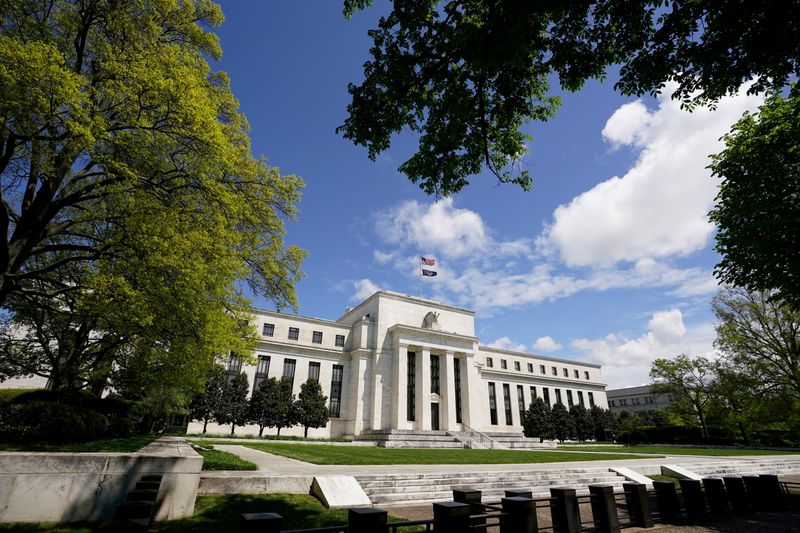By Howard Schneider
WASHINGTON (Reuters) -Fewer than 200,000 businesses in the United States may have failed during the first year of the COVID-19 pandemic, a lighter toll than initially feared and one that may have had relatively little impact on unemployment, according to Federal Reserve research.
The figure contrasts with the early forecasts that the pandemic would leave America's "Main Street" desolate as well as with polls that continue to show large percentages of U.S. small business owners are worried about their survival.
Perhaps 600,000 businesses, most of them small firms, fail in any given year, and U.S. central bank researchers estimated that from March 2020 through February of this year the figure has been perhaps a quarter to a third higher.
That included 100,000 "excess" failures among firms engaged in close-contact services such as barber shops and nail salons, a sector described by the Fed research group as the sector hardest hit by the economic fallout from the pandemic.
While potentially devastating for the owners and employees of those firms, "relative to popular discussion ... our results may represent an optimistic update to views about pandemic-related business failure," the authors wrote.
Offsetting the hit to those services-oriented businesses, they noted, carry-out restaurants, grocery stores and outdoor recreation companies seemed to suffer fewer failures than usual, with the net result being a smaller-than-anticipated blow to the overall economy.
"Many industries have likely seen lower-than-usual exit rates, and exiting businesses do not appear to represent a large share of U.S. employment," the researchers wrote.
FEDERAL AID
The study was the latest to sound a positive note on an economic recovery that has proceeded faster than expected, with top Fed officials confident that much of the potential permanent damage had been avoided. Earlier research had anticipated widespread business failures due to the pandemic, with 400,000 or more small firms going dark.
Census and other surveys continue to reflect stress among some firms that continue to operate, and the Fed researchers acknowledged that more failures could occur if, for example, banks, landlords and creditors become less flexible with their business tenants as conditions return to normal.
Nor does the study account for the millions of still-lost jobs at surviving firms that cut staff or reduced operations, or for the disproportionate losses felt among racial or ethnic groups over-represented in the most devastated industries.
But it does start to put some scope around one of the potential economic scars from the pandemic, and suggests that small businesses appear to have been both more resilient than anticipated, and were propped up effectively by loans from the Paycheck Protection Program and other federal aid.
The Fed and the U.S. government began flooding the economy with credit and outright grants for businesses and households last spring, so much so that personal incomes actually rose even as unemployment spiked to historical levels.
The funding included $755 billion in forgivable PPP loans spread across more than 9.5 million firms. Although the roughly 30 million U.S. small businesses are diverse, the vast bulk involve sole practitioners who have no employees, with the remainder employing only a handful. So the failures of these businesses, even in large numbers, don't register deeply in terms of overall employment.
Official government statistics on business failures typically lag the actual demise of those firms by a year or more. The Labor Department's Bureau of Labor Statistics and the Commerce Department's Census Bureau have not yet released any formal estimates on the pandemic's final toll on companies and their workers.

To augment the scarce data, the Fed researchers coupled available government information with high-frequency, alternative measures such as cellphone location data mapped onto retail locations, records from payrolls processor ADP, and other sources.
They found that while the early fears of a large COVID-19 hit may have been warranted given the numbers of businesses that shut down in the spring of 2020, by the end of August there was "no evidence of excessive, ongoing business inactivity; in fact shutdown was well below normal by late 2020."
